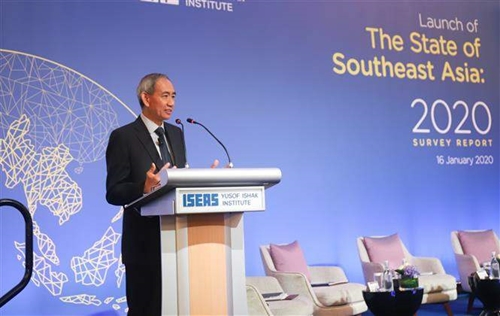Choi told the Vietnam News Agency that as ASEAN Chair, Vietnam ensured that equal attention was given to discussions on the immediate pandemic response and the longer-term post-pandemic recovery plans.
Apart from the COVID-19 ASEAN Response Fund, one of the earliest mechanisms developed to deal with the immediate health challenges, the grouping has also formulated an ASEAN Comprehensive Recovery Framework to guide the region into post-pandemic recovery action.
Vietnam has not lost sight of the other important ongoing issues such as climate change, economic cooperation, sustainable growth, digitalisation and the East Sea.
As the pandemic spread and countries had to close their borders in March, Vietnam took the initiative to pivot to a virtual mode of conducting meetings at various levels – SOM, Ministerial and Summit to keep up the momentum.
    |
 |
|
Choi Shing Kwok, Director of Singapore’s ISEAS – Yusof Ishak Institute and head of the ASEAN Studies Centre under ISEAS – Yusof Ishak Institute |
The format of the meetings became more effective as officials grew more accustomed to the online mode of engagement, which overcame the obstacles and saved time but also resulted in new dynamics.
Regarding the 37th ASEAN Summit and related meetings, slated for November 12-15, Choi said the summit is going to be overshadowed by the COVID-19 pandemic.
Southeast Asia, which accounts for only 2 percent of global COVID-19 cases and 1 percent of fatalities, has fared comparably well in managing the pandemic on the whole.
However, the pandemic has still severely impacted lives and livelihoods in the region, particularly for the most vulnerable segments of the populations. Apart from the direct health and socio-economic damage caused by COVID-19, increased external geo-political competition has also affected the region while some ASEAN member states like Thailand, Malaysia and Myanmar have also experienced domestic political uncertainties alongside the pandemic.
At the same time, there have been some silver linings emerge in Southeast Asia. Global supply chains are increasingly pivoting to the region in an acceleration of the diversification and relocation trends that were already emerging prior to the pandemic.
The region’s emerging economies, such as Malaysia, Thailand and Vietnam, are poised to reap these benefits. COVID-19 has also accelerated Southeast Asia’s digitalisation push, with companies making the shift to doing business online and governments allocating budgets to aid businesses in their transformation efforts.
Given this, the 37th ASEAN Summit will lead the region in dealing with this challenging condition and also help chart a path for countries and for the region to move through it, Choi believed.
Asked about the possibility of signing the Regional Comprehensive Economic Partnership (RCEP) at the 37th ASEAN Summit, the expert said the RCEP negotiations have been proceeding smoothly.
“We understand that the possibility of signing the RCEP at the 37th ASEAN Summit is high,” he said. “The signing will be a much-needed boost of morale to many in this region as we continue to battle the economic downturn brought on by the pandemic and also show that the region is determined to build back better in the face of ongoing challenges to multilateral trade.”
Source: VNA